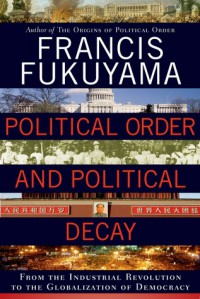Political Order and Political Decay: From the Industrial Revolution to the Globalization of Democracy
 There is a certain beauty to this book. The author completely convinces the listener that there is no more important field of study to understand the world and how we got where we are then Political Science. The author is that good at laying the foundations for his points. Moreover, the author is telling an incredible complicated story with many different moving parts but he excels at telling you what he's going to tell you, tells you, and then tells you what he just told you, and then just in case you didn't understand his points he'll explain them once again by comparing and contrasting with some diametrically opposed counter examples.
There is a certain beauty to this book. The author completely convinces the listener that there is no more important field of study to understand the world and how we got where we are then Political Science. The author is that good at laying the foundations for his points. Moreover, the author is telling an incredible complicated story with many different moving parts but he excels at telling you what he's going to tell you, tells you, and then tells you what he just told you, and then just in case you didn't understand his points he'll explain them once again by comparing and contrasting with some diametrically opposed counter examples. This volume can be read independently from the first volume. The listener should just pick the area he is most interested in. This volume looks at the more direct relationships to how our current political entities evolved to their current configurations.
He explained China to me in such a way that I have to reconsider how I perceive them. For the last 30 years, their form of authoritarian rule might have been much better than a democracy since they have such a small middle class relative to the other classes. The concerns expressed at Tiananmen Square have fallen on the wayside in today's China. Overall, he gave a fascinating discussion concerning China.
I know that Political Science isn't the most important way to understand who we are, but it definitely helps in our understanding by thinking about our institutions, rule of law, and state structures. The one thing that the author did that really irritated me was in parts of the book he would make the false equivalence claim such as "both the Tea Party and progressive Democrats are to blame for ...", any sentence that starts that way is flawed. He argues there is a mushy middle between the two extreme positions and neither one is correct. I'll let the listener decide for himself, as for me I disagree. He also made a statement that our current congress wanted to shut down the government rather than pay for past debts owed by the federal government and putting us into a fiscal catastrophe. I just don't see it that way. It was only one political party that wanted to renege on past government debt.
Overall, the book is very likeable, makes one appreciate the role for Political Scientist and gives one valid way for describing how we got where we are today.







